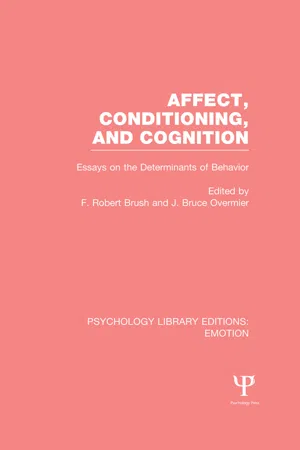
Affect, Conditioning, and Cognition (PLE: Emotion)
Essays on the Determinants of Behavior
- 398 pages
- English
- ePUB (mobile friendly)
- Available on iOS & Android
Affect, Conditioning, and Cognition (PLE: Emotion)
Essays on the Determinants of Behavior
About This Book
Originally published in 1985, this title was a retrospective appreciation of the late Richard L. Solomon. His pre- and postdoctoral students from past years presented the 22 papers which are published in this volume. The book reflects the breadth of Solomon's impact through his teaching and research.
The first part contains a chapter that provides a bit of history in a retrospective appreciation of the several foci of Solomon's research career. This chapter sets the stage for those that follow and reduces their diversity by providing a degree of historical understanding. The second part on the role of properties of fear contains chapters that address various issues associated with the role of conditioned fear. The third part contains papers that address cognitive, information-processing issues in the context of Pavlovian conditioning of appetitive and aversive events, reasoning and timing. The fourth part continues the exploration of the phenomenon of learned helplessness first discovered in Solomon's laboratory. The fifth part addresses various issues associated with the Solomon and Corbit opponent-process theory of motivation and affect. The final part, on applications to human and cultural issues, contains chapters on such diverse subjects as cross-cultural analyses of aggressive behavior in children, the analysis of resistance to change in industrial organizations, the concept of liberty in formulating research issues in developmental psychology, and the status of free will in modern American psychology.
Frequently asked questions
Information
I A RETROSPECTIVE
APPRECIATION OF
RICHARD L. SOLOMON

1 Perspectives
on the Psychology
of Richard L. Solomon
And God gave Solomon wisdom and understanding exceeding much, and largeness of heart, even as the sand that is on the sea shore. And Solomon’s wisdom excelled the wisdom of all the children of the east country, and all the wisdom of Egypt. For he was wiser than all men … and his fame was in all nations round about. And he spake three thousand proverbs: and his songs were a thousand and five … he spake also of beasts, and of fowl, and of creeping things, and of fishes. And there came of all people to hear the wisdom of Solomon, from all kings of the earth, which had heard of his wisdom. (I Kings 4:29–34)
In his original paper, Hunt noted that the evidence for the stress currently placed upon infantile experience as a determinant of adult behavior derives from approaches which observe first the effect in the adult and then look backward for the causes. In the psychoanalysis, the method consists of noting the characteristics of an adult and then looking backward for the cause through his free associations into a childhood already past. In comparative study of cultures, the method consists of noting certain common behavioral characteristics of the adults in a society, and then examining their method of rearing children for the causes. Hunt sought to provide a predictive, experimental test of the hypothesis that infantile experience can endure and can effect (sic) adult behavior. Using rats as subjects, because of their relatively brief span of life, he found that animals submitted to feeding-frustration in infancy hoarded more than two and one-half times as much as their freely fed litter-mate controls. (p. 291)
The authors assume that the dogs, even with long delays of punishment, quickly ‘know’ which food results in punishment administered by the experimenter. This is a type of cognitive learning that can span long temporal delays. The dogs know what they are not supposed to eat! However, when the experimenter is missing, and the dogs are faced with an uncertainty or a change in the controlling stimulus situation, the authors’ argument is that cognition is not enough. The hungry dogs cannot be certain any longer that eating the taboo horsemeat will result in punishment, because the experimenter is gone. It is under these conditions of changed social stimulation that the authors believe the conditioned emotional reactions of the dogs “take over”. If emotional conditioned responses take mediational control of behavior under conditions of cognitive uncertainty, the temporal characteristics of Pavlovian emotional conditioning will manifest themselves. This is why delay of punishment is a powerful determiner of subsequent resistance to temptation and the emotional concomitants of taboo violations. (p. 237)
The chapter on Speech and Language is new to experimental psychology. Miller’s contribution is different and exciting. He gives a great deal of attention to the analysis of verbal productions, including statistical analyses and analysis in terms of information theory. Phonetics and phonemics are discussed. There are sections on “talking and thinking,” which, while not as developed as some areas of experimental psychology, will probably become increasingly important. This chapter is worth studying. (p. 128)
Table of contents
- Cover
- Half Title
- Title Page
- Copyright Page
- Original Title Page
- Original Copyright Page
- Table of Contents
- Preface
- Part I: A Retrospective Appreciation of R. L. Solomon
- Part II: The Role and Properties of Fear and Aversion
- Part III: Integration of Information
- Part IV Learned Helplessness
- Part V Opponent Process Theory
- Part VI Extensions to Human and Cultural Issues
- Author Index
- Subject Index